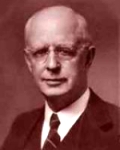|
MAJOR BIBLE THEMES
Dr.
Louis Sperry Chafer
*
|
"Bible
doctrines are the bones of revelation and the
attentive Bible student must be impressed with the
New Testament emphasis on sound doctrine (Matt.
7:28; John 7:16, 17; Acts 2:42; Rom. 6:17; Eph.
4:14; 1 Tim. 1:3; 4:6, 16; 6:1; 2 Tim. 3:10, 16;
4:2, 3; 2 John 1:9, 10)." |
*
This is the first increment
of Major Bible Themes which, Lord willing, will
eventually be presented in its entirety.
This work may serve as a wonderful outline for personal or group
Bible study.
~ editor ~
*
AUTHOR'S
INTRODUCTION
and
CHAPTER I - THE
BIBLE: THE WORD OF GOD
*
AUTHOR'S INTRODUCTION
Much of the material
in this book was published in the Sunday School Times (April to
December, 1925) as the author's notes on the Whole Bible
Lessons. Since the original series was incomplete as a
representation of the more important doctrines of the
Scriptures, several chapters have been added.
Those chapters which were originally written as Bible class
lessons are outlined and named according to the direction given
by the lesson committee and are based on the Scripture
selections suggested by them.
This book is in no sense intended to be a treatise on systematic
theology. In its preparation, a limited number of the most vital
and practical themes have been chosen, and an attempt has been
made to adapt these brief discussions to the needs of the
untrained Christian.
To each chapter a list of questions has been added which, it is
hoped, may make the studies more useful both to individuals and
to groups. The student who would be versed on these subjects
should look up every passage cited and continue the study of
each theme until all the questions can be answered from memory.
Although the writer
presumably has made a careful study of the various subjects
treated, it is not his prerogative to dictate what another shall
believe; but rather to point out what the Bible teaches. Faith
should always rest on a personal understanding of the
Scriptures, rather than on the teaching of men.
Bible doctrines are the bones of revelation and the attentive
Bible student must be impressed with the New Testament emphasis
on sound doctrine (Matt.
7:28; John 7:16, 17; Acts 2:42; Rom. 6:17; Eph. 4:14; 1 Tim.
1:3; 4:6, 16; 6:1; 2 Tim. 3:10, 16; 4:2, 3; 2 John 1:9, 10). Not
knowing the doctrines of the Bible, the child of God will be,
even when sincere, tossed to and fro,
and carried about with every wind of doctrine, by the sleight of
men and cunning craftiness, whereby they lie in wait to deceive;
the many well-meaning believers who are drawn into modern cults
and heresies being sufficient proof. On the other hand, the
divine purpose is that the servant of Christ shall be fully
equipped to preach the word; be instant
in season, out of season; reprove, rebuke, exhort with all
longsuffering and doctrine.
These chapters are released with the prayer that they may honor
Him whose glory and grace are supreme, and that some among the
children of God may be helped more accurately
to speak the things which become sound
doctrine.
~ Lewis Sperry Chafer ~
*
CHAPTER I
THE BIBLE: THE WORD OF GOD
It is a marvelous
thing that we have an infallible Book from the hand of God.
Every student and teacher should be fully convinced of this
fact. There are two lines of evidence to be traced: (1) That
which is internal, or the Bible's own claim concerning itself,
and (2) that which is external, or outward, obvious facts
concerning the Scriptures.
I. THAT
WHICH IS INTERNAL
By hundreds of passages the
Bible both directly declares and assumes itself to be the Word
of God (note Psa. 12:6; 93:5; 119:18, 98, 99, 100, 105, 130;
Isa. 55:10, 11; Jer. 23:29; Rom. 10:17; 2 Tim. 2:15). Psalm
19:7-11 declares that the Old Testament is the Word of Jehovah.
Six perfections of that Word are named with six corresponding
transformations which that Word accomplishes. Likewise, Hebrews
1:1, 2 states that God is speaking in the Old Testament through
the prophets and in the New Testament through His Son.
II. THAT WHICH
IS EXTERNAL
Considering the external
evidence that the Bible is the Word of God, the Book is a
phenomenon and as such presents a challenge to the most
skeptical among men. Certain facts should be noted:
1. Its Continuity.
The Bible appears in one volume in which there is a perfect
continuity of historical sequence from the creation to the new
heavens and the new earth; a perfect unfolding of doctrine from
the blade to the full corn in the ear; from type to antitype;
from prophecy to its fulfillment; and the anticipation,
presentation, realization, and exaltation of the most perfect
Person on earth or in Heaven. Yet this one volume which exhibits
the most perfect continuity of thought that the world has ever
seen is, nevertheless, a collection of sixty-six books Śwritten
by about forty authors - kings, peasants,
philosophers, fishermen, physicians, statesmen, scholars, poets,
and plowmen - who could have known but little of
each other, since their lives were lived in various countries
and their writings were distributed over sixty generations of
human history, representing a period of about sixteen hundred
years.
2. The Extent of its Revelation.
In its unfolding of truth, the Bible is inexhaustible. Like a
telescope it sweeps the universe from the heights of Heaven to
the depths of hell, and traces the works of God from their
beginning to their end. Like a microscope it reveals the
minutest details of the plan and purpose of God and the
perfection of His creation. Like a stereoscope it places all
beings and objects whether on earth or in Heaven in right
relation the one to the other. Though written in the earlier
days of human knowledge when the present world discoveries could
not reasonably have been disclosed, it is in harmony with every
discovery made by man.
3. Its Output.
In fullest satisfaction the Bible is claimed by all races as
their own, and is, as no other book, translatable into every
tongue. It has already been translated into over seven hundred
and seventy different languages and dialects. Thirty societies
are now specializing in its publication, and over thirty million
copies are printed annually. Of this number the British Bible
Society publishes every hour more than two thousand copies. The
French infidel Voltaire who died in 1778 predicted that the Bible
would become obsolete within a hundred years. Contrary to the
statement of this skeptic, the Bible abides. For nineteen
hundred years it has endured the systematic, destructive attacks
from Satan and men; but never has its predicted endurance been
more tested than now when those who pose as its friends and
exponents are subtly denying its most vital truths and its
supernatural character. Its influence is transforming. To the
unsaved it is the sword of the Spirit
(Eph. 6:17), and to the saved it is a cleansing, sanctifying,
and reflecting power (Eph. 5:25, 26; John 17:17; 2 Cor. 3:18); it
is the basis of all true civilization, law, and morality.
4. Its Subject Matter.
The supernatural character of this Book is seen in the fact that
it deals as freely with the unknown and otherwise unknowable as
it does with that which is known, and those who follow its
teachings are unfailingly led in the paths of God's eternal
Truth. Likewise, as no other book, the Bible accounts for those
who do not receive its teachings. Of them it records that they
are unregenerate men who receive not the things of the Spirit of
God, neither can they know them because only by the Spirit are
these things discerned (1 Cor. 2:13). Its qualities are real,
for those who know it best love it most.
5. As Literature.
Merely as literature, the Bible is supreme. It satisfies the
simple-minded and entrances the sage; yet here, again,
consideration should be given to the limitations of its human
authors. To God alone be the glory!
6. Unprejudiced Authority.
This Book is not prejudiced in favor of men. It unhesitatingly
records the sin, the weakness of the best of men and the doom of
all who rely alone on those virtues and merits which are their
own. Men do not so speak of themselves. It assumes to be a
message from God to man rather than a message from man to man.
It speaks with authority of things in Heaven and things on
earth; of the seen and of the unseen; of God, of angels, and of
men; of time and of eternity; of life and of death; of sin and
of salvation; of Heaven and of hell. Apart from its message,
there is no knowledge of these eternal issues in all the world:
with its message, there is certainty, assurance, and peace.
7. The Supreme Character.
Above all else in this supernatural Book is its revelation of
the Person and glory of God as manifested in His Son. Let no one
suppose that this Character is a mere fiction - the
invention of a mortal mind; for His perfections have never been
comprehended by the wisest and holiest of this earth. If He were
a mere fiction, let the mind which conceived Him be extolled and
adored!
8. The Bible and Christ Compared.
Because of the combination of supernatural qualities which enter
into the Bible, a similarity may be observed between the Bible
as the Written Word and the Lord Jesus Christ as the Living
Word. They are both supernatural as to their origin, presenting
an inscrutable and impeccable blending of that which is divine
and that which is human. They both exercise a transforming power
over those who believe, and are alike allowed of God to be set
at naught and rejected by those who do not believe. The
untainted, undiminished divine perfections are embodied in each.
The revelations which they disclose are at once as simple as the
demands of a child, as complex as the infinite treasures of
divine wisdom and knowledge, and as enduring as the God whom
they reveal.
QUESTIONS
1. What are the two general
lines of evidence that the Bible is the Word of God?
2. Name six transformations it accomplishes as stated in Psalms
19:7-11.
3. Since the Bible was written by so many different authors and
in various ages, how do you account for its marvelous
continuity?
4. Recount the various classes of men who are the human authors.
5. Does the Bible revelation conflict with modern discoveries?
6. To what extent is the Bible being circulated?
7. What was Voltaire's prediction in 1778?
8. Has the Bible ever been more assailed by its enemies than
now?
9. Does the Bible hesitate to speak with authority on
supernatural and eternal things?
10. What does it say of the limitation of man?
11. What is peculiar about its literary appeal?
12. What evidence is suggested by the fact that the Bible
discloses the sins of all men?
13. What character is its supreme revelation?
14. Indicate the outstanding similarity between Christ and the
Scriptures.
*
|
Major Bible
Themes herein presented is its first edition
(copyright 1926), is in the public domain, and may be
freely downloaded in its entirety or chapter by chapter
at
http://www.spiritual-research-network.com/major_bible_themes.html.
Information for purchase
of the revised edition by John F. Walvoord (copyright
1974) may be found at the same address.
Dr. Louis Sperry Chafer (1871-1952)
was the founder of Dallas Theological Seminary, and from
1924 until his death, served as the its first President
and Professor of Systematic Theology. His
ground-breaking eight volume Systematic Theology,
first published in 1947-1948,
was the first systematization of a premillennial,
dispensational interpretation of the Scriptures.
|
*
Return to Home Page

|


